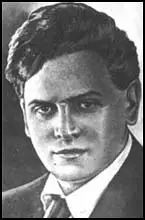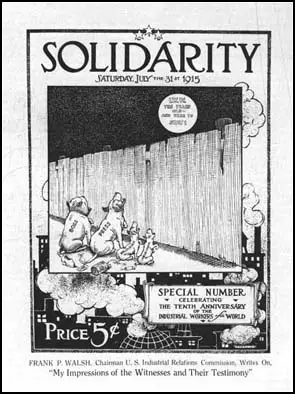Ralph Chaplin

Ralph Chaplin was born in Ames, Kansas, 1887. The family moved to Chicago in 1893, where his family endured a great deal of poverty. At the age of seven, he saw a worker shot dead during the Pullman Strike. He did a variety of low-paid jobs before moving to Mexico where he became a supporter of Emiliano Zapata.
Chaplin joined the Industrial Workers of the World (IWW) in 1913. He was one of the most popular writers in the organisation. As well as editing Solidarity and the Industrial Worker, wrote poems, songs and pamphlets for the organisation. He also produced a large number of illustrations for these journals. Along with Joe Hill, was the most popular songwriter in the IWW. This included Solidarity Forever and The Commonwealth of Toil.
During the First World War Chaplin opposed the anti-war campaign led by Frank Little. However, in September, 1918, Chaplin was one of the 165 IWW leaders charged with trying to "prevent, hinder and delay the execution" of eleven Acts of Congress and Presidential Proclamations covering the war program. Found guilty under the terms of the Espionage Act, Chaplin was sentenced to 20 years imprisonment and a fine of $20,000.

Ralph Chaplin (31st July, 1915)
Chaplin was released on bond in 1919 pending appeal. Over the next few months he toured the country making speeches against the Sedition Act (1918) that was being used by A. Mitchell Palmer and John Edgar Hoover in a campaign against radicals and left-wing organizations. Palmer claimed that Communist agents from Russia were planning to overthrow the American government.
On 7th November, 1919, the second anniversary of the Russian Revolution, over 10,000 suspected communists and anarchists were arrested. Palmer and Hoover found no evidence of a proposed revolution but large number of these suspects were held without trial for a long time. The vast majority were eventually released but Emma Goldman, Alexander Berkman, Mollie Steimer, and 245 other people, were deported to Russia.
Chaplin was strongly anti-communist and declined to join his close friend, William Haywood and several other leaders of the Industrial Workers of the World who decided to flee to the Soviet Union. Chaplin returned to Leavenworth Penitentiary in Kansas but was pardoned in 1923 along with other IWW victims of the federal government.
Chaplin continued to work for the IWW and became editor of its newspaper Industrial Worker. In 1936 he left the IWW and the following year became editor of the Voice of the Federation. However, his anti-communism was not appreciated and he was eventually ousted from the post.
In 1941 Chaplin was recruited by the American Federation of Labor to edit the Tacoma Labor Advocate. He also began work on his autobiography, Wobbly, that was published in 1948. Soon afterwards he became a Roman Catholic. As his biographer, John R. Salter, has pointed, "converted to Roman Catholicism he continued to back grass-roots unionism and libertarian radicalism and to publish poetry; and lent his efforts to American Indian rights."
Ralph Chaplin died in Tacoma in 1961.

